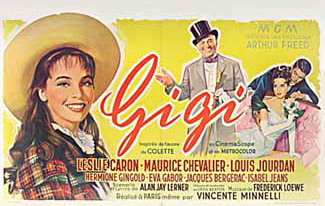The film is a musical by Alan Jay Lerner and Frederick Loewe, who at
this stage in their careers, had brought the world the musicals Brigadoon
(of which there was a 1947 screen adaptation), as well as Paint Your
Wagon and My Fair Lady (which wouldn't be adapted for the
screen until 1969 and 1964, respectively). Two years later, they would
write Camelot, which would be adapted for the screen in 1967.
Unlike their other works, the movie Gigi was based on book by
Colette, which had previously been turned into a play as well as into
a nonmusical 1949 French film, starring Danièle Delorme in the
title role. In fact, Lerner and Loewe wouldn't produce a stage version
of this musical until 1973.
At the time, My Fair Lady had just opened on Broadway. Since
the play's sets and costumes received so much praise, Lerner insisted
on using the play's production designer, Cecil Beaton, on the film.
In many ways, Gigi is not a typical musical. For one, it lacks
big dance numbers, and most of the songs are performed as solos, as
if they represent the inner thoughts of the characters. Still, it contains
some classic songs, as well as superb acting by Leslie Caron in the
lead role. Audrey Hepburn, however, who she had played the role on stage,
was the first choice for Gigi. She declined, since she was making Funny
Face.
The story, which follows the growing relationship between rich playboy
Gaston Lachaille (Louis Jourdan) and the young Gigi, may be read differently
by today's viewers, who might see the film as a musical apology for
pedophilia.
The movie begins with Gaston's elderly uncle, Honoré Lachaille
(Maurice Chevalier), singing as he wonders through a lively turn-of-the-century
Paris park. This scene, along with many others, was shot on location.
Honoré sings the well-known song, "Thank
Heaven for Little Girls." [LINK PLAYS MUSIC] The song contains
the lyrics: "Thank heaven for little girls / for little girls get
bigger every day! // Thank heaven for little girls / they grow up in
the most delightful way!" In this way, he sets up the story, as
well as the character Gigi, 16, whom we meet playing with other young
women in the park.
Of course, Chevalier plays Honoré as a lovable scalawag, but
there is something a bit off-putting to today's viewers about an older
man wondering around a park, winking at young girls and singing about
how wonderful it is that they'll soon be women.
At the beginning of the movie, Gigi wears very young, girlish clothes.
At the time, Caron was actually 28, and it was fairly clear in the opening
scene that she was older than the teenage girls with whom she is seen
playing.
But through her mannerisms and body language, such as her clumsy way
of throwing her leg over a chair to sit down, Caron soon convinces the
viewer that she is, indeed, a young woman. She wasn't able, however,
to convince the producers to use her real voice for the musical numbers,
and she was overdubbed on the songs, without her knowledge or consent.
Gigi lives with her grandmother (Hermione Gingold) and has been taking
etiquette lessons from her grandmother's sister, Aunt Alicia (Isabel
Jeans), who strives to teach her how to behave like a lady, with the
goal of turning her into a courtesan for wealthy suitors. Despite a
great effort on Aunt Alicia's part, the lessons haven't taken, and Gigi
is a wild tomboy.
Gaston, whose romantic exploits are chronicled in the tabloids, breaks
up with an unfaithful lover, afterwards engaging in public displays
of partying and frivolity so as to save face. He embarsk on this program
of conspicuous fun at the advice of his Uncle Honoré, an aging
playboy himself. But really, Gaston doesn't take pleasure in such society
functions. Rather, he enjoys quiet moments with Gigi and her grandmother,
who are old friends of the family. The three take a vacation together
at the shore, which provides him with some welcome relaxation and cements
the friendship between himself and Gigi.
Upon their return, the grandmother tells Aunt Alicia about how well
the trip went, and the two decide to groom Gigi to become a suitable
romantic partner for Gaston. Thus, we're treated to a montage of Gigi
taking a crash course on etiquette. After that, a simple costume change
completes the transformation, and Gaston, who is initially confused
about experiencing new feelings for a woman he has known as a little
girl, falls in love. Again, this presents a slight ick factor for the
modern viewer, as it smacks ever so slightly of pedophilia.
While, the plot can be excused as a product of the times, this movie's
major disappointment is that it doesn't make full use of Leslie Caron's
fantastic dance ability, which she demonstrated in An American in
Paris (1951). She does, however, use movement in creative ways,
and her transformation from a girl to a woman is impressive.
Aside from a couple well-known songs, such as "I
Remember It Well" [LINK PLAYS MUSIC], many of the songs are
fairly forgettable. I believe now I understand why I had trouble locating
this movie, which wasn't available through Blockbuster.com. Eventually,
I had to buy a copy from Amazon.com. The film simply doesn't suit modern
tastes in musical entertainment.
Still, Leslie Caron's performance is fantastic, and the movie offers
a rare opportunity to see the famous French actor Maurice Chevalier
in an English-speaking role. The film is also considered the last of
MGM's traditional musicals, since it was the last filmed by producer
Arthur Freed, who had been responsible for all of MGM's classic movie
musicals.
In addition, the film walked off with all 9 Oscars for which it was
nominated, a feat not surpassed until The Lord of the Rings: Return
of the King (11 wins).


